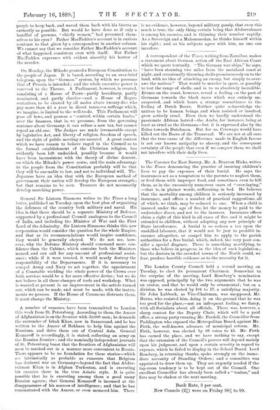On Monday, the Mikado granted a European Constitution to the
people of Japan. It is based, according to an over-brief telegram, upon the " German" system, by which we presume that of Prussia is intended ; and the whole executive power is reserved to the Throne. A Parliament, however, is created, consisting of a House of Peers—partly hereditary, partly nominated, and partly elective—and a House of Repre- sentatives, to be elected by all males above twenty-five who pay more than £5 a year in direct taxes,—a suffrage which, we imagine, is limited to the well-to-do. This Parliament will pass all laws, and possess a " control, within certain limits," over the finances, that is, we presume, from the governing sentence about Germany, it can refuse a new tax, but cannot repeal an old one. The Judges are made irremovable except by legislative Act, and liberty of religion, freedom of speech, and the right of public meeting are assured. A great contest which we have reason to believe raged in the Council as to the formal establishment of the Christian religion, has evidently been left undecided, possibly because it would have been inconsistent with the theory of divine descent, on which the Mikado's power rests ; and the main advantage to the people from the Constitution probably will be that they will be amenable to law, and not to individual will. The Japanese have an idea that with the European method of government their nation will develop the European strength ; but that remains to be seen. Trousers do not necessarily develop marching power.






































 Previous page
Previous page